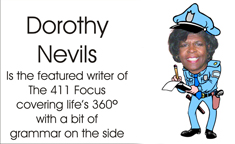
Grammar is sometimes like driving. Another person along on the ride is OK. When the third party joins in, that's when problems arise.
Contributed By:Dorothy Nevils
Grammar Patrol: One, two... That's all
“Sweetheart, you can’t just step on the brake when you want to stop,” I explained, as the car lurched violently and flatlined. “You have to use the brake – and the clutch. Otherwise the car will die!”
That’s what I told my niece when the cousins were together for the summer. The oldest was the only one with a driver’s license, and my oldest was the only one who could drive a stick. However, knowledge + permit = nothing if I wasn’t in the passenger’s seat. So, I needed to teach my niece.
Grammar is sometimes like driving. You don’t have much trouble when there’s one, or even two people. If it’s just you alone, you don’t have to worry about somebody getting hungry, or needing to stop for a potty break. You stop when you want to, when you need to… Even “two” is okay: No craning and straining to include everybody in the conversation, or fiddling with the blower so that everybody’s comfy.
When the third party joins in, that’s when problems arise. It’s a totally different ride. The third party doesn’t play by the same rules. Adjustments have to be made: The speakers are too loud, or not loud enough. The seat is too far back, making the “3rd person” uncomfortable. You have to change the way you talk to accommodate #3.
That’s the way it is with 3rd person, present tense verbs. A change is gonna come. You can put your money on that! As “Uptown Funk” says, “If you don’t believe me, just watch.”
You remember from your language arts teacher in grade school – or, if you had your head on the desk instead of paying attention, you revisited that same truth in junior high, and two, three, or even four times in high school – that third person is the person spoken about. It’s indicated by four pronouns – he, she, it, and they. Also, nouns (persons, places, or things) are third person. Whenever you use one of these as a subject, you – must put an s on the present tense verb. You cannot say, “Mary sound good”: You sound horrible!
Now, if Mary sings with her sister, feel free to say, Mary and Alicia (or they, or the twins, or anything that would mean more than one) sound good when they sing! Just remember that any word, or combination that indicates one requires an s on the verb.
Omitting s from verbs that require them is one of the worst examples of bad grammar I can think of – and it is so simple! It stands out like, not a sore thumb, but a missing thumb… or a turquoise thumb… or a 10-inch thumb! It is so obvious that I cannot see why it wouldn’t just lock the jaws of someone before it could get out of one’s mouth… or uproot the teeth and send them scattering across the floor while the guilty party stood and tried to look “not guilty!”
There have been times I’ve been called a witch, I’m sure, under someone’s… no, a bunch of “someones’” breath, but when I hear “s-less” people talking, I wish that, just for a moment, I could be… I cackle just to think of it!
Story Posted:09/01/2017
|